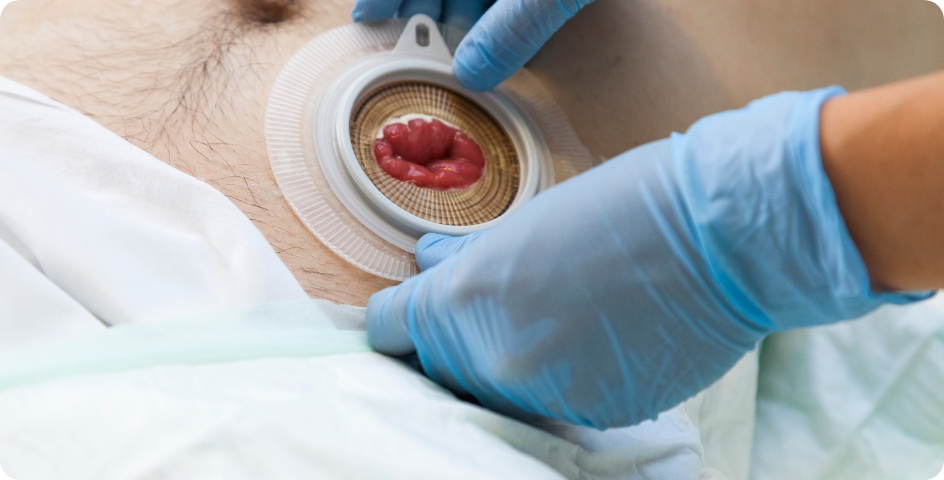Colorectal Cancer Treatment in Turkey
Healthy Türkiye helps you find the best colorectal cancer treatment in Turkey at affordable prices and adopts a 360-degree service approach in all areas of health through affiliated hospitals.
- Medical Treatment
- Cancer Treatment in Turkey
- Image Guided Radiotherapy in Turkey
- Image-Guided Radiosurgery in Turkey
- Intensity-Modulated Radiation Therapy in Turkey
- Kidney Cancer Treatment in Turkey
- Leukemia Treatment in Turkey
- Liver Cancer Treatment in Turkey
- Lung Cancer Treatment in Turkey
- Lymphoma Treatment in Turkey
- Bladder Cancer Treatment in Turkey
- Bone Marrow Transplant in Turkey
- Brachytherapy in Turkey
- Brain Cancer Treatment in Turkey
- Breast Cancer Treatment in Turkey
- Cervical Cancer Treatment in Turkey
- Chemotherapy in Turkey
- Colon Cancer Treatment in Turkey
- Hormonal Therapy in Turkey
- Bone Cancer Treatment in Turkey
- Endometrial Cancer Treatment in Turkey
- Gastric Cancer Treatment in Turkey
- Gene Therapy in Turkey
- Melanoma Treatment in Turkey
- Mesothelioma Treatment in Turkey
- Metastatic Cancer Treatment in Turkey
- Mouth Cancer Treatment in Turkey
- Neuroblastoma Treatment in Turkey
- Oral Cancer Treatment in Turkey
- Ovarian Cancer Treatment in Turkey
- Pancreatic Cancer Treatment in Turkey
- Photodynamic Therapy in Turkey
- Proton Therapy in Turkey
- Sarcoma Treatment in Turkey
- Skin Cancer Treatment in Turkey
- Stereotactic Body Radiation Therapy in Turkey
- Targeted Therapy in Turkey
- Testicular Cancer Treatment in Turkey
- Throat Cancer Treatment in Turkey
- Thyroid Cancer Treatment in Turkey
- Uterine Cancer Treatment in Turkey
- Volumetric-Modulated Arc Therapy in Turkey
- Prostate Cancer Treatment in Turkey
- Robotic Radical Prostatectomy Surgery in Turkey
- Hemato-Oncology Treatment in Turkey
- Skin Cancer Malignant Melanoma Treatment in Turkey
- Colorectal Cancer Treatment in Turkey
- Radiotherapy in Turkey
- Immunotherapy in Turkey
- TIL Therapy in Turkey
- TCR-T Therapy in Turkey
- CAR NK Cell Therapy in Turkey
- Gene Editing Therapy in Turkey
- Dendritic Cell Vaccines in Turkey
- Oncolytic Virus Therapy in Turkey
- NK-92 Cell Therapy in Turkey
- Cytokine Therapy in Turkey
- Bispecific T-cell Engager in Turkey
- Macrophage-Based Therapy in Turkey
- IPSC-Derived Immunotherapies in Turkey
- Glossectomy in Turkey
- Regulatory T Cell Therapy in Turkey
- Gamma Delta T Cells Therapy in Turkey
- Homepage
- Medical Treatment
- Colorectal Cancer Treatment in Turkey

About Colorectal Cancer Treatment in Turkey
In Turkey, colorectal cancer, also known as bowel cancer, colon cancer, or rectal cancer, is any cancer that affects the colon and rectum. Colorectal cancer treatment in Turkey, is performed reliably in most hospitals by our specialist doctors with developing technology. Cancer is not a disease to be feared as much as it was 10-15 years ago. With the gradual development of technology and science, these fears have been reduced.
Colorectal cancer begins when healthy cells in the lining of the colon or rectum change and grow out of control, forming a tumor. A tumor can be cancerous or benign. A cancerous tumor is malignant, meaning it can grow and spread to other areas of the body. A benign tumor means the tumor can grow but will not spread. Colorectal cancer treatment works best when the cancer is found early. Screening tests can help find polyps and can find colorectal cancer that is still in its early stages and hasn’t spread yet.
Healthy Türkiye is one of the pioneers and most preferred companies in the field of medical tourism in Turkey. Colorectal cancer treatment in Turkey offers world-class medical facilities, comparable with any of the Western or European countries. Turkey has state-of-the-art hospitals and the finest medical experts, so with the most excellent infrastructure, and the best possible medical facilities, accompanied by the most competitive costs, you can get colorectal cancer treatment done in Turkey at the lowest rates.

Colorectal Cancer Treatment Procedure in Turkey
In Turkey, colorectal cancer usually begins as a polyp, a noncancerous growth that may develop on the inner wall of the colon or rectum as people get older. If not treated or removed, a polyp can become potential cancer. Finding and removing polyps can prevent colorectal cancer. There are different types of polyps.
Adenomatous polyps (adenomas): These polyps may change into cancer. Thus, adenomas are called pre-cancerous conditions. The 3 types of adenomas are tubular, villous, and tubulovillous.
Hyperplastic polyps and inflammatory polyps: These polyps are more common, but in general they are not pre-cancerous. Some people with large hyperplastic polyps might need colorectal cancer screening with colonoscopy more often.
Sessile serrated polyps (SSP) and traditional serrated adenomas (TSA): These polyps are usually treated like adenomas because they have a higher risk of colorectal cancer.
Other factors that may make a polyp more likely to contain cancer or increase someone’s risk of developing colorectal cancer include: if a polyp is larger than 1 cm, if more than 3 polyps and if dysplasia is seen in the polyp after it’s removed.
Colorectal Cancer Symptoms
As with other types of cancer, colorectal cancer usually does not show symptoms in its early stages. However, when colorectal cancer begins to spread in the patient’s body, it is possible to see the general main symptoms. But having several of these symptoms certainly does not mean that you have colorectal cancer. Colorectal cancer can start in the large bowel (colon cancer) or back passage (rectal cancer). It is also called bowel cancer.
The symptoms of colorectal (bowel) cancer can include:
Bleeding from the rectum, or blood in your poo
A change in your normal bowel habits, such as looser poo, pooing more often, or constipation
A lump that your doctor can feel in your back passage or tummy (abdomen), more commonly on the right side
Losing weight
Pain in your abdomen or rektum
Tiredness and breathlessness caused by a lower-than-normal level of red blood cells (anemia)
Sometimes cancer can block the bowel. This is called a bowel obstruction. The symptoms include:
Cramping pains in the tummy
Bloated feeling
Constipation
In Turkey, the diagnosis of colorectal cancer is determined as a result of scans and tests. If you have more than half of these symptoms and are worried about colorectal cancer, you should quickly contact Healthy Türkiye’s specialist doctors for your questions about cancer treatment in Turkey.
Colorectal Cancer Causes
Some factors may increase your risk of colorectal cancer. But having any of these risk factors doesn’t mean that you will undoubtedly get colorectal cancer.
Age: The risk of colorectal (bowel) cancer increases as people get older. The majority of colorectal cancers occur in people older than 50. For colon cancer, the average age at the time of diagnosis for men is 68 and for women is 72. For rectal cancer, it is age 63 for both men and women.
Gender: Men have a higher risk of developing colorectal cancer than women.
Ethnic group: Colorectal cancer is more common in black people than in white people.
Family history of colorectal cancer: If a relative, such as a parent or a sibling, has been diagnosed with colorectal cancer, your risk may be increased. This is especially valid when family members are diagnosed with colorectal cancer before age 60.
Rare inherited conditions: Members of families with certain uncommon inherited conditions have a higher risk of colorectal bowel cancer. These include Lynch syndrome, familial adenomatous polyposis (FAP), attenuated familial adenomatous polyposis (AFAP), Gardner syndrome, Turcot syndrome, Juvenile polyposis syndrome (JPS), Muir-Torre syndrome, MYH-associated polyposis (MAP), and Peutz-Jeghers syndrome (PJS).
Adenomatous polyps (adenomas): Polyps aren’t cancer, but some types of polyps called adenomas can develop into colorectal cancer over time.
Personal history of certain types of cancer: People with a personal history of colorectal cancer previously or a diagnosis of ovarian cancer or uterine cancer are more likely to get colorectal cancer.
Physical inactivity and obesity: People who lead an inactive lifestyle and people who are overweight or obese may have an increased risk of colorectal cancer.
Diagnosis for Colorectal Cancer Treatment in Turkey
People who suspect colorectal cancer should go to the hospital for early diagnosis and take some tests. Early diagnosis is very important in colorectal (bowel) cancer. Screening can detect polyps before they become get cancer. In 80% of cases, a doctor diagnoses colorectal cancer after performing a colonoscopy because the person has symptoms.
Colonoscopy: Colonoscopy in Turkey is the gold-standard diagnostic tool for colorectal cancer. It has a high level of trusted accuracy and can show precisely where a tumor is. This procedure involves using a long, thin, flexible tool called a colonoscope that contains a light and a camera. It allows the doctor to see the whole colon and rectum. They may remove polyps or take a sample of tissue, for testing during the procedure.
Blood stool test: This test checks for blood in a stool sample. Many conditions can cause blood in stool, and a positive result does not necessarily mean that colorectal cancer is present.
Stool immunochemistry: Also known as a fecal occult blood test, this checks for blood in the lower colon.
Stool DNA test: This test checks for DNA markers that colon cancer or precancerous polyps shed into the stool. If the result is positive, a colonoscopy is necessary.
Flexible Sigmoidoscopy: This procedure involves using a sigmoidoscope, a flexible, thin, lighted tube, to examine the rectum and sigmoid colon.
Barium Enema X-ray: Barium is a dye that can reveal any unusual features on an X-ray. A doctor introduces it into the bowel as an enema.
CT Colonography: CT colonography is images of the colon. This procedure is less invasive than a colonoscopy, but if it reveals a mass, the person needs a colonoscopy.
Imaging Scans: Ultrasound, CT, or MRI scans can show if cancer has spread to another area of the body.
Recommended frequency for early diagnosis:
Flexible sigmoidoscopy every 5 years, or every 10 years with the FIT, or FOBT every year
Colonoscopy, every 10 years
DCBE, every 5 years
CT colonography, as often as your doctor recommends
Guaiac-based FOBT, every year
FIT, every year
Stool DNA test, as often as your doctor recommends
Also, routine screening detects 11% of cases. The following are the most screening and diagnostic procedures for colorectal cancer.

We Care About Your Health
Healthy Türkiye provides the best for your health and comfort. You will feel privileged with us.
7/24 Quality Personal Assistance Throughout Your Journey
Customizable for You All-Inclusive Packages
Get the Right Advice for your Health
Types of Colorectal Cancer Treatment in Turkey
The best approach to treatment for colorectal cancer depends on many factors such as the size and location of tumors, cancer stage, and whether the cancer is recurrent.
Surgery for Colorectal Cancer Treatment in Turkey
Surgery is the primary treatment for colorectal (bowel) cancer that is limited to the colon. It aims to remove cancerous tissue, including tumors and affected lymph nodes, and prevent cancer from spreading. Surgery may remove all traces of early-stage colorectal cancer. In the later stages, surgery can’t stop cancer from spreading, but removing a blockage can help ease any symptoms.
Colorectal cancer surgery may be open, involving a large incision. Also, it may be laparoscopic, a less invasive type of surgery that requires tiny incisions. The surgeon uses robotic devices during the surgery. Most types of colon cancer surgery include:
Local Excision: This procedure involves removing early cancerous tissues. During the procedure, a doctor removes polyps and some colon tissue.
Colectomy: This procedure involves removing some or all of the colon. The surgeon reattaches the remaining segments. Other names for this procedure are hemicolectomy, partial colectomy, or segmental resection.
Total colectomy: This procedure involves removing the whole colon. The surgeon only recommends it if there are many polyps.
Removing Blockages: Sometimes cancer blocks all or a portion of the colon. When this happens, the surgeon may place a stent to open the colon.
Non-Surgical Colorectal Cancer Treatment in Turkey
A person might receive 1 type of medication at a time or a combination of medications given at the same time. They may also be given as part of a treatment plan that includes surgery and/or radiation therapy.
Chemotherapy: Chemotherapy destroys cancerous cells throughout the body. This may help treat colon cancer or shrink a tumor before colorectal surgery. It can also help relieve symptoms in the later stages of cancer.
Targeted Therapy: In Turkey, targeted therapy involves taking drugs that target specific proteins to slow or prevent the growth of cancerous cells.
Immunotherapy: This drug-based helps the immune system detect and eliminate cancer cells.
Radiation Therapy: This procedure involves using high-energy beams of radiation to destroy cancerous cells and prevent them from multiplying.
The medicines used to treat cancer are continually being evaluated. Talking with your specialist in Turkey is generally the best way to learn about the medications prescribed for you, their purpose, and their potential side effects or interactions with other medications.
Colorectal Cancer Stages
The “stage” of colorectal cancer refers to how far it has spread. Determining the stage helps doctors choose the most appropriate treatment method. There are different guidelines for staging.
Stage 0: This is the earliest stage, also known as carcinoma in situ. The cancer cells are only in the inner layer of the colon or rectum.
Stage 1: Cancer cells have grown through the inner layer of the colon or rectum but have not spread beyond the wall of the rectum or colon. This stage is sometimes called Duke’s A colon cancer.
Stage 2: Cancer cells have grown through or into the wall of the colon or rectum but have not yet reached nearby lymph nodes. This stage is sometimes called Duke’s B colon cancer.
Stage 3: Cancer cells have reached nearby lymph nodes but not other parts of the body. This stage is sometimes called Duke’s C colon cancer.
Stage 4: Cancer cells are spread in other parts of the body, such as the liver or lungs. This stage is sometimes called Duke’s D colon cancer.
Sometimes, treatment eliminates cancer but it comes back in the same area or another one. This is called “recurrent” cancer.
Living with Colorectal Cancer
Living with colorectal cancer, patients getting diagnosed can positively change their quality of life. Firstly, Healthy Türkiye’s doctors and teams in Turkey will support you both medically and psychologically. Colorectal cancer treatment proceeds differently for each people. So, the best support methods are the options that you will feel good about.
During colorectal cancer treatment in Turkey, if the patient’s symptoms are not too severe, they can continue their daily life. Also spending time with family and friends can be among these options. In the treatment of colorectal cancer, you can reduce your symptoms or side effects by exercising and eating a healthy diet.

2026 Cost of Colorectal Cancer Treatment in Turkey
All types of medical attention like colorectal cancer treatment are very affordable in Turkey. Many factors are also included in determining the cost of colorectal cancer treatment in Turkey. Your process with Healthy Türkiye will last from the time you decide to have colorectal cancer treatment in Turkey until the time you are fully recovered even if you are back home. The exact colorectal cancer treatment procedure cost in Turkey depends on the type of operation involved.
The cost of colorectal cancer treatment in Turkey does not demonstrate many variations in 2026. Compared to costs in developed countries like the United States or the UK, colorectal cancer treatment costs in Turkey are relatively low. So, it’s no wonder patients from across the world visit Turkey for colorectal cancer treatment procedures. However, the price is not the only factor affecting choices. We suggest looking for hospitals that are safe and have colorectal cancer treatment reviews on Google. When people decide to seek medical help for colorectal cancer treatment, they will not only have had low-cost procedures in Turkey, but also the safest and best treatment.
At clinics or hospitals contracted with Healthy Türkiye, patients will receive the best colorectal cancer treatment from specialist doctors in Turkey at affordable rates. Healthy Türkiye teams to provide medical attention to colorectal cancer treatment procedures and high-quality treatment to patients at a minimum cost. When you contact Healthy Türkiye assistants, you can get free information about the cost of colorectal cancer treatment in Turkey and what this cost covers.
In the UK, the mean annual cost of treating a patient with rectal cancer is estimated to be approximately £15,000, while the mean annual cost of treating a patient with colon cancer is approximately £10,000.
In the USA, the mean annual cost of treating a patient with rectal cancer is estimated to be approximately $60,000, while the mean annual cost of treating a patient with colon cancer is approximately $40,000.
In Turkey, the mean annual cost of treating a patient with rectal cancer is estimated to be approximately $5,000, while the mean annual cost of treating a patient with colon cancer is approximately $4,000.
Price of Colorectal Cancer Treatment in the UK?
Price of Colorectal Cancer Treatment in the USA?
Price of Colorectal Cancer Treatment in Turkey?
Why Is Colorectal Cancer Treatment Cheaper in Turkey?
One of the main considerations before traveling abroad for colorectal cancer treatment is the cost-effectiveness of the whole process. Many patients think that when they add flight tickets and hotel expenses to their colorectal cancer treatment costs, it will become very expensive to travel, which is not true. Contrary to popular belief, round-trip flight tickets to Turkey for colorectal cancer treatment can be booked very affordably.
In this case, assuming you are staying in Turkey for your colorectal cancer treatment, your total travel expense of flight tickets and accommodation will only cost less than any other developed country, which is nothing compared to the amount that you are saving. The question “why is colorectal cancer treatment cheaper in Turkey?” is so common between patients or people simply curious about getting their medical treatment in Turkey. When it comes to colorectal cancer treatment prices in Turkey, there are 3 factors that allow cheaper prices:
The currency exchange is favorable for whoever looking for colorectal cancer treatment has a euro, dollar, or pound;
The lower cost of living and cheaper overall medical expenses such as colorectal cancer treatment;
For colorectal cancer treatment, incentives are given by the Turkish Government to medical clinics working with international clients;
All these factors allow for cheaper colorectal cancer treatment prices, but let’s be clear, these prices are cheaper for people with strong currencies (as we said, euro, dollar, Canadian dollar, pound, etc).
Every year, thousands of patients from all over the world come to Turkey to get colorectal cancer treatment. The success of the healthcare system has increased in recent years, especially for colorectal cancer treatment. It’s easy to find well-educated and English-speaking medical professionals in Turkey for all kinds of medical treatment such as colorectal cancer treatment.

Why Choose Turkey for Colorectal Cancer Treatment?
Turkey is a common choice among international patients seeking advanced colorectal cancer treatment. Turkey’s health procedures are safe and effective operations with a high success rate like colorectal cancer treatment. The increasing demand for high-quality colorectal cancer treatment at affordable prices has made Turkey a popular medical travel destination. In Turkey, colorectal cancer treatment is performed by highly experienced and trained doctors with the most advanced technology in the world. colorectal cancer treatment is done in Istanbul, Ankara, Antalya, and other major cities. The reasons for choosing colorectal cancer treatment in Turkey are as follows:
High-quality hospitals: Joint Commission International (JCI) accredited hospitals have dedicated colorectal cancer treatment units that are specially designed for patients. International and national strict protocols provide effective and successful colorectal cancer treatment for patients in Turkey.
Qualified experts: The expert teams include nurses and specialist doctors, together to carry out colorectal cancer treatment according to the patient’s needs. All the included doctors are highly experienced in performing colorectal cancer treatment.
Affordable price: The cost of colorectal cancer treatment in Turkey is affordable compared to Europe, the USA, the UK, Singapore, Australia, etc.
The high success rate: Highly experienced specialists, the best available technology, and stringently followed safety guidelines for post-operative care of the patient, resulting in a high success rate for colorectal cancer treatment in Turkey.
Is Colorectal Cancer Treatment Safe in Turkey?
Did you know Turkey is one of the most visited destinations for colorectal cancer treatment in the world? It is ranked one of the most visited tourist destinations for colorectal cancer treatment. Over the years it has also come to be a very popular medical tourism destination too with many tourists coming in for colorectal cancer treatment. There are so many reasons why Turkey stands out as a leading destination for colorectal cancer treatment. Because Turkey is both safe and easy to travel to too with a regional airport hub and flight connections to pretty much everywhere, it is preferred for colorectal cancer treatment.
The best hospitals in Turkey have experienced medical staff and specialists who have performed thousands of medical services such as colorectal cancer treatment. All procedures and coordination related to colorectal cancer treatment are controlled by the Ministry of Health in accordance with the law. Over many years, the greatest progress in medicine has been observed in the field of colorectal cancer treatment. Turkey is known among foreign patients for its great opportunities in the area of colorectal cancer treatment.
To emphasize, besides the price itself, the key factor in selecting a destination for colorectal cancer treatment is certainly the standard of medical services, the hospital staff’s high expertise, hospitality, and the safety of the country.
All-Inclusive Package for Colorectal Cancer Treatment in Turkey
Healthy Türkiye offers all-inclusive packages for colorectal cancer treatment in Turkey at much lower prices. Extremely professional and experienced doctors and technicians carry out high-quality colorectal cancer treatment. The cost of colorectal cancer treatment in European countries can be quite expensive, especially in the UK. Healthy Türkiye provides cheap all-inclusive packages for a long and short stay of colorectal cancer treatment in Turkey. Because of many factors, we can provide you with many opportunities for your colorectal cancer treatment in Turkey.
The price of colorectal cancer treatment differs from other countries due to medical fees, staff labor prices, exchange rates, and market competition. You can save much more on colorectal cancer treatment compared to other countries in Turkey. When you purchase a colorectal cancer treatment all-inclusive package with Healthy Türkiye our healthcare team will present hotels for you to choose from. In colorectal cancer treatment travel, you will have the price of your stay included in the all-inclusive package cost.
In Turkey, when you purchase colorectal cancer treatment all-inclusive packages through Healthy Türkiye, you will always receive VIP transfers. These are provided by Healthy Türkiye, which is contracted with highly qualified hospitals for colorectal cancer treatment in Turkey. Healthy Türkiye teams will organize everything about colorectal cancer treatment for you and have you picked up from the airport and safely brought to your accommodation. Once settled in the hotel, you will be transferred to and from the clinic or hospital for colorectal cancer treatment. After your colorectal cancer treatment has been successfully completed, the transfer team will return you to the airport in time for your flight home. In Turkey, all packages of colorectal cancer treatment can be arranged upon request, which relaxes the minds of our patients. You can reach out Healthy Türkiye for everything you need to know about colorectal cancer treatment in Turkey.
The Best Hospitals in Turkey for Colorectal Cancer Treatment
The best hospitals in Turkey for colorectal cancer treatment are Healthy Türkiye, Memorial Hospital, Acıbadem International Hospital, and Medicalpark Hospital. These hospitals attract patients from all over the world seeking colorectal cancer treatment due to their affordable prices and high success rates.
Best Doctors and Surgeons in Turkey for Colorectal Cancer Treatment
The best doctors and surgeons in Turkey for colorectal cancer treatment are highly skilled professionals who offer specialized care and advanced procedures. With their expertise and state-of-the-art techniques, these specialists ensure that patients receive high-quality colorectal cancer treatment and achieve optimal health results.

Frequently Asked Questions
This is a general overview of what to expect. Your recovery time after the surgery will depend on your age, whether you had keyhole or open surgery, and your general health. You will probably be in hospital for 4-6 days in Turkey, but it can take 2–3 months to fully recover.
Once a colon carcinoma develops, if it is going to spread outside the colon, it will do so in less than two years.
Get screened for colorectal cancer.
The 3 main symptoms of bowel cancer are blood in the stools (feces), a change in bowel habits, such as more frequent, looser stools, and abdominal pain.
There’s no upper age limit for colon cancer screening in Turkey. But the benefits of screening decline after age 75 for most people and there’s little evidence to support continuing screening after age 85.
